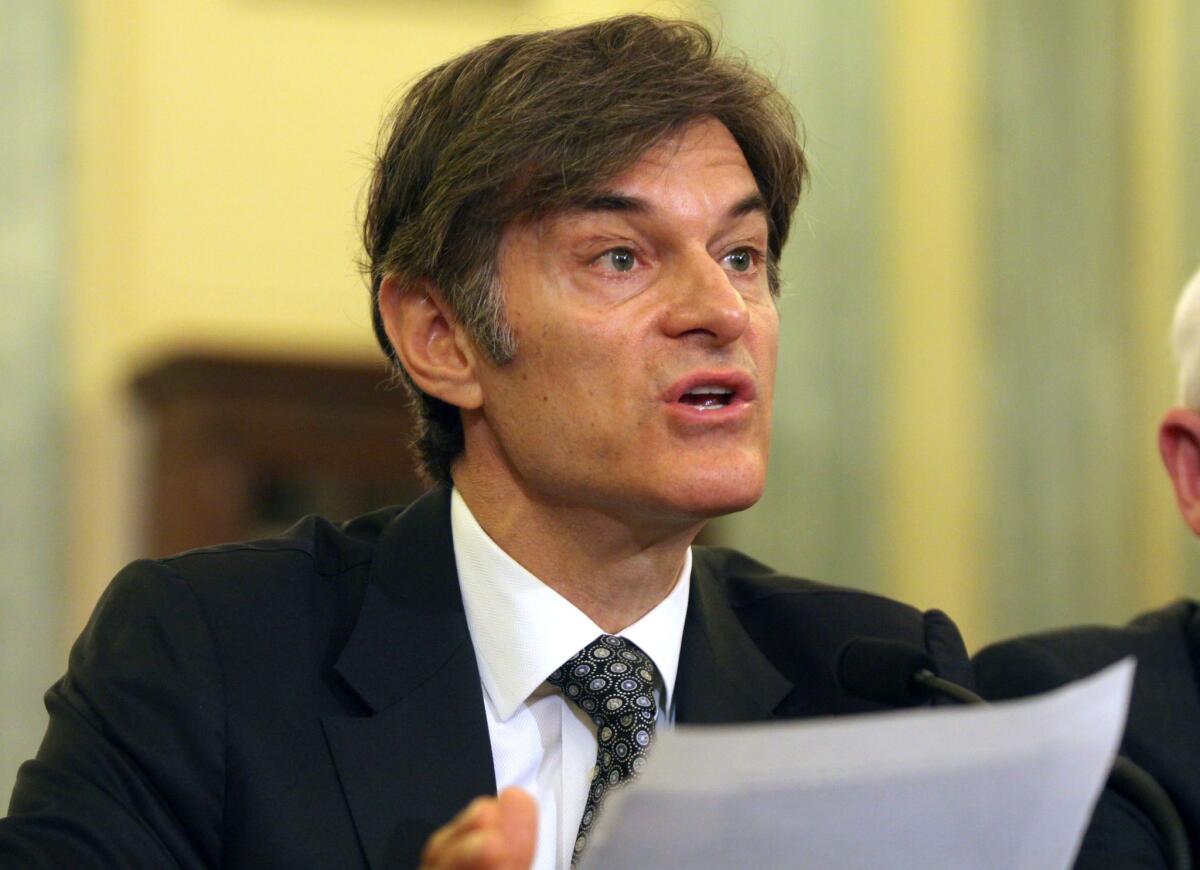These doctors are trying to turn the tide against ‘quack’ Dr. Oz

In the hot seat: Dr. Oz defends himself before Congress last June.
Physicians are finally speaking out against Dr. Mehmet Oz and the “quack treatments and cures” he promotes to the huge audience of his television show.
Led by Henry I. Miller, a physician, former Food and Drug Administration official, and fellow at Stanford University’s Hoover Institution, 10 doctors from across the country urged Columbia University to drop Dr. Oz from its faculty. They made the point in a letter dated Wednesday to Columbia’s president, chairman of its board of trustees, and dean of the medical school, where Oz is listed as vice chair of the department of surgery. Miller says that numerous other doctors have said they would have signed it had they known of its existence.
“We are surprised and dismayed that Columbia University’s College of Physicians and Surgeons would permit Dr. Mehmet Oz to occupy a faculty appointment, let alone a senior administrative position in the Department of Surgery,” they wrote. Because of the publicity Oz gives to nonscientific and even potentially damaging nostrums, they added, “members of the public are being misled and endangered, which makes Dr. Oz’s presence on the faculty of a prestigious medical institution unacceptable.”
“It’s just a disgrace,” Miller told me Friday, citing Oz’s “total disdain for science and science-based medicine.”
It appears that Columbia may need rather more convincing. Its only response to Miller and his colleagues was a one-sentence email from a PR man reading, in part: “Columbia is committed to the principle of academic freedom and to upholding faculty members’ freedom of expression for statements they make in public discussion.”
We’ve written before about Dr. Oz’s warm embrace of charlatanism and fraudulent medicine. In front of a Senate committee last June he was raked over the coals by Sen. Claire McCaskill (D-Missouri): “Why, when you have this amazing megaphone, do you cheapen your show like that?” she asked him. His response was that he’s merely being “a cheerleader for the audience.”
In a statement released by the producers of “The Dr. Oz Show” to USA Today, Oz said, “We provide multiple points of view, including mine, which is offered without conflict of interest. That doesn’t sit well with certain agendas which distort the facts.”
That won’t do. For detailed takedowns of his irresponsible behavior, see Todd Neale at MedPage Today, Miller at Slate.com last week, and Julia Belluz’s heroic voyage into the fantasy land of Oz at Vox.com. We examined here the difficulty of reporting on quacks and charlatans like Oz without giving them more publicity.
Miller said he was inspired to organize the letter by his research for the Slate article. What’s significant about it is that it’s aimed not directly at Oz but one of his chief enablers, Columbia University. That’s a good approach because such well-heeled supporters of public mountebanks typically get a free pass.
In this case, there’s an unsavory symbiotic relationship between Columbia and Oz. He gets the prestige and credibility of a faculty appointment at an Ivy League medical center; Columbia basks in the reflected glory from a glistening media star.
“We don’t think that Columbia should put its vast respect and renown behind him,” says Gilbert Ross, executive director of the American Council on Science and Health, who signed Miller’s letter.
Ross dismissed Columbia’s refusal to interfere with Oz’s “freedom of expression.”
“No one is trying to take his right of free expression away,” he told me. Oz’s promotion of unproven nostrums and misleading claims is a professional issue, and his professional relationship with Columbia is a legitimate topic of examination.
Ross and Miller both argued that Oz might be regarded as harming patients if any followed his advice and either indulged in harmful therapies he recommended or were steered away from effective treatments he questioned, though on at least one occasion a judge ruled that Oz’s responsibility to members of his TV audience didn’t rise to the level of the doctor-patient relationship. We sought comment from Kenneth Prager, chairman of the medical school’s medical ethics committee, but his office said he couldn’t be reached.
Miller said he thinks Columbia should launch a “two-pronged” investigation of Oz” by academic physicians into “whether his pronouncements are compatible with the standards for the practice of medicine at any academic medical center,” and a second into whether he has a personal financial interest in any of the treatments or recommendations he offers on his show.
Keep up to date with the Economy Hub. Follow @hiltzikm on Twitter, see our Facebook page, or email [email protected].
More to Read
Inside the business of entertainment
The Wide Shot brings you news, analysis and insights on everything from streaming wars to production — and what it all means for the future.
You may occasionally receive promotional content from the Los Angeles Times.










